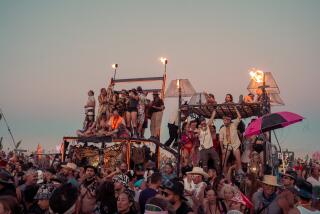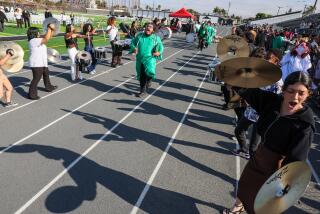Camp Is All Play : Young Musicians of Note Band Together at Arrowbear
RUNNING SPRINGS â It used to be a tricky road before it was paved. It twisted, it was steep, it had blind curves. But if you knew how to read the signs, it was a piece of cake.
You slowed down at Lento, sped up a bit at Poco Accel., kept going until you put on the brakes at Ritard and parked at Fine.
Everybody who followed Music Camp Road to its end knew what those signs meant, or they learned in a hurry. Because where the road ended--and still ends--there began a rarefied little world on 3 acres of wooded hillside where students lived an almost Walden-like existence, where music dominated every summer day and where lifetime friendships could be made over a Sibelius orchestral score.
Arrowbear Music Camp, isolated away from the highway near this San Bernardino County mountain town, has for nearly 50 years been a second summer home to student musicians throughout Southern California.
Since the first student orchestra arrived there in 1942, more than 10,000 students have kept the thin, clear summer air filled, almost constantly, with music. It is the oldest summer music camp in the American West.
Founded by Fred Ohlendorf, the coordinator for music education for the Long Beach Unified School District from 1947-70, the camp today is run by Ohlendorfâs daughter and son-in-law and draws students mostly from Orange and Los Angeles counties, many of whom return year after year. Over the life of the camp, many students have gone on to become counselors, and several have stayed to teach as members of the staff.
For nearly half a century, there has been a kind of unity of experience through the generations of students that seems to transcend age, societal change, popular musical tastes and the prominence of music in the public schools (or the lack of it).
Arrowbear, its alumni say, has always represented a kind of musical and social coming of age, a world apart.
âIt played a tremendous role in my life when I was a youngster,â said Nadine Penn, a legal secretary from Santa Monica who summered at Arrowbear as a student and counselor from 1952 to the early 1960s. âIt was always a support place. It served a lot of purposes, not the least of which was a musical education, but it was a social place too. Many of your closest friends came from there, because you had your music and so many other things in common. Itâs so much a part of your life that itâs a natural extension to have your kids go too.â
And, in Pennâs case, thatâs what happened. Her daughter--Janelle Mettler, 21, a college student from Santa Cruz and a violinist like her mother--worked at the camp as a counselor last month. She has been to Arrowbear, as student and counselor, for 10 summers.
âI visited (the camp) as a young kid with my mom,â she said, âand I heard the stories sheâd tell about her friends, and that she still keeps in touch with them.â
Mettler said the friends she has made in her decade there are âtoo many to count. It was a kind of ideal for me to shoot for in my daily life, being around special, creative, intelligent people. Itâs a family place where people get together to make music and get together just as people.â
The family that spawned thousands of musical progeny began with Fred and Edna Ohlendorf. The camp originally was operated by her father as a Lutheran church camp. When she inherited it, he--then a junior high school music teacher in Long Beach--began bringing student musicians there in the summer.
Later, the Ohlendorf children, Carole and Rick, began working at the camp each summer alongside their parents. During the 1960s, Caroleâs husband, Dennis Dockstader, began overseeing the maintenance of the camp.
Fred Ohlendorf became the dominant musical personality in hundreds of young lives; many musicians credit him with the inspiration to pursue professional musical careers or to continue their music as amateurs in their adult years. He was known to everyone simply as âMr. Oâ and conducted many of the campâs instrumental ensembles himself.
After Ohlendorf died in 1986, Dockstader and his wife took over the operation of the camp and now offer sessions, mostly of one or two weeks, for elementary-age students and those of junior high, high school and some college age.
âThe philosophy of the camp has evolved over the years, but itâs very clear that itâs a family organization,â said Bruce Bales, a choir director at UCI who worked last month as the director at Arrowbearâs choral music session and whose wife, Anne--who was a student there in the 1960s--was the choirâs accompanist.
âI think things are more relaxed now than they used to be,â he said, âbut clearly the thing that remains is that this is a camp experience centered around music. Other camps can be more music festival-oriented, but here thereâs a bonding that takes place thatâs separate from the music-making, and both are very intense.
âWeâve been here at the choral session for four years and for me, itâs the most intense week of the year. I have a great time and I always look forward to it, but itâs a work-until-you-drop kind of intensity. Itâs an escape where people can get away from their regular lives and be really focused. It changes peopleâs lives.â
The days can be long. In general, there are rehearsals of either small or large ensembles throughout each morning, afternoon and evening, and even that is not enough for many of the students. They often retreat to isolated corners of the camp to practice alone or to work on duets, trios and quartets with friends.
Social isolation, however, is impossible. âItâs almost like being in the service, but itâs less threatening than that,â said Greg Robertson, 31, the son of a former Arrowbear choir director who attended the camp as a student and later worked there as a dishwasher and a counselor.
âYouâre motivated to work really hard,â he said, âand youâre working toward a common goal, the concert at the end of each week. You learn to deal with an ensemble of three other people or 45 other people emotionally as well as musically. You learn a lot of social skills here that youâre not going to get anywhere else.â
Some, such as Albert Jeung, learn a career. Jeung, 24, who attended Arrowbear as a student, counselor, nurse and cook for 13 years (he worked as music coordinator this summer), is about to begin a new job as band director at Capistrano Valley High School.
âThis camp is what got me interested in teaching,â he said. âI was all set to be an architect. Coming up here every year gave me the itch to teach.â
The campâs music curriculum, he said, acts as a kind of social catalyst.
âWhen we do music here,â he said, âitâs downright business. But it also brings everybody together. When you play music, your personality shows through.â
Michael Thomas, 20, a student from Santa Ana who attended Arrowbear both as a choral student and counselor this summer, said there is little musical competition between students.
âThe love of music comes through really strong here,â he said. âItâs more than making sure your fingers are in the right place. It doesnât mean thereâs less talent, thereâs just an emphasis on the beauty of the music that makes the attitude of the people different.
âYou feel that youâre trying to make something beautiful, that youâre a team working toward one single product, not that youâre trying to play better than that other player.â
In fact, said Ross Durand, 23, a counselor and nine-year Arrowbear veteran from Thousand Oaks, the camp in some cases offers a sense of relief among students, a kind of social latitude that may not exist for them during the school year.
âIn high school, if youâre a musician, the name thatâs common for you is band geek, â he said. âAll of us have had the experience of taking abuse in public schools for being musicians, and we were all sort of separated socially in a lot of settings. But thereâs something that is particularly special about a place where a bunch of musicians get together. This is a place they can come where being a musician is OK. In fact, itâs the norm.â
Many alumni try to recapture that experience, however briefly, by visiting the camp. Robertson, for instance, who lives in San Diego and restores classic cars (and still sings in his church choir), was in the camp late last month for a one-day visit, camera in hand, photographing the evening orchestra rehearsal. Former Arrowbearites (as they call themselves) say that when they drop in for a visit, they arenât surprised to see old friends in the camp who have decided to do the same thing.
âYou never really stop going,â Penn said. âYou may not be actively involved, but to this day if I go up on a given weekend, Iâm going to run into three or four or five people I knew when I went there years ago.â
Easily the largest reunion at the camp happened in 1986, on the 45th anniversary of the campâs founding and only weeks after Ohlendorfâs death. Nearly 200 Arrowbear alumni showed up to augment the campâs student orchestra. Akira Endo, the former conductor of the American Ballet Theater Orchestra and a former Arrowbear student, counselor and teacher, conducted Tchaikovskyâs â1812 Overture.â
Dockstader said he is planning another large-scale reunion next year, for the 50th anniversary. And another procession of musicians of all ages--a half-century of friends who will understand the signs along the road--will make the trip up the hill on Music Camp Road.
âThis camp is close to a dream and probably always has been for the people who have gotten the most out of it,â he said. âI think the people who have been back here year after year have been the ones for whom it worked out that way, who had a successful dream and wanted to come back and try again.
âItâs like the best class you ever had in school, the class you loved so much you never wanted to miss it because the makeup of the people was so wonderful.
âMy father-in-law used to say that it wasnât his camp, it was their camp, that the people who came here made it, they built it. Iâm trying to carry that idea on.
âAnd every now and then I think, âIâm running somebodyâs dream. Isnât that something?â â


